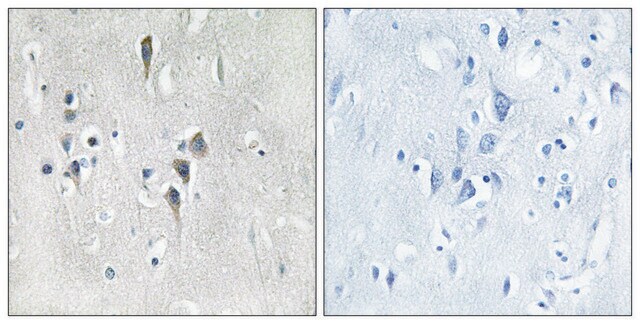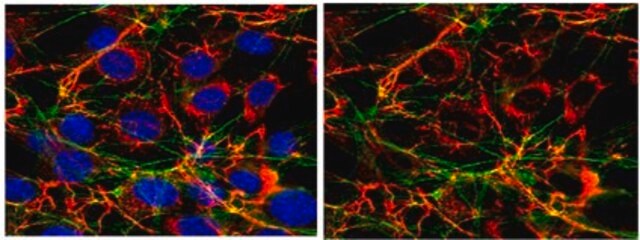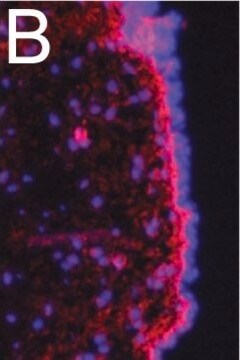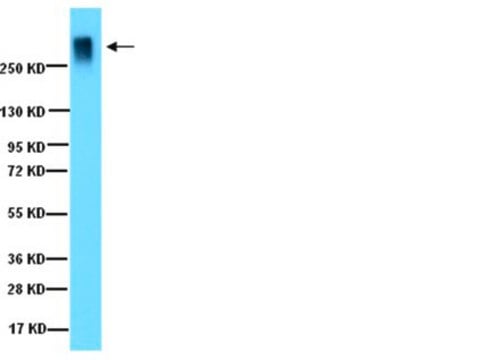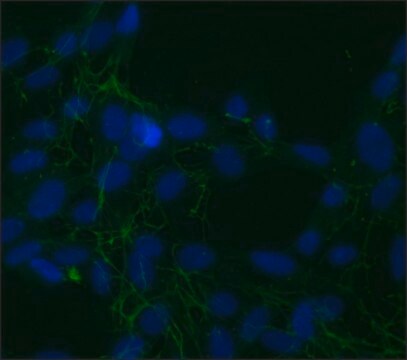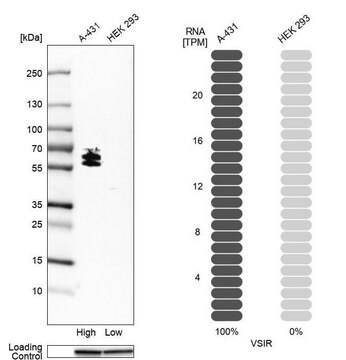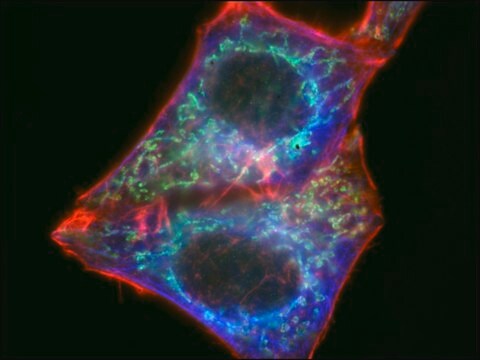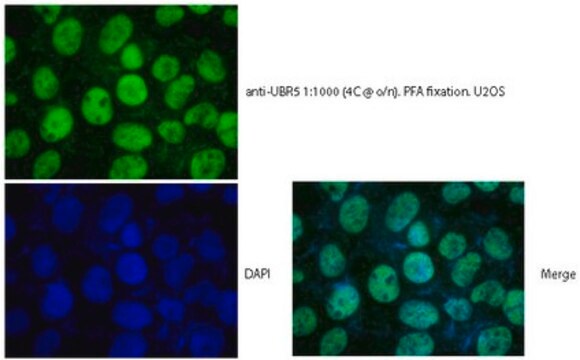おすすめの製品
由来生物
rabbit
抗体製品の状態
affinity purified immunoglobulin
抗体製品タイプ
primary antibodies
クローン
polyclonal
化学種の反応性
bovine
メーカー/製品名
Chemicon®
テクニック
ELISA: suitable
immunofluorescence: suitable
immunohistochemistry: suitable (paraffin)
radioimmunoassay: suitable
western blot: suitable
UniProtアクセッション番号
輸送温度
dry ice
ターゲットの翻訳後修飾
unmodified
詳細
Fibronectin (FN) is an extracellular adhesion molecule and it is involved in many cellular processes, including tissue repair, embryogenesis, blood clotting, and cell migration/adhesion.
Fibronectin exists in two main forms: 1) as an insoluble glycoprotein dimer that serves as a linker in the ECM (extracellular matrix), and; 2) as a soluble disulphide linked dimer found in the plasma (plasma FN). The plasma form is synthesized by hepatocytes, and the ECM form is made by fibroblasts, chondrocytes, endothelial cells, macrophages, as well as certain epithelial cells.
Fibronectin sometimes serves as a general cell adhesion molecule by anchoring cells to collagen or proteoglycan substrates. FN also can serve to organize cellular interaction with the ECM by binding to different components of the extracellular matrix and to membrane-bound FN receptors on cell surfaces. The importance of fibronectin in cell migration events during embryogenesis has been documented in several contexts, e.g.: 1) mesodermal cell migration during gastrulation can be blocked by injection of Arg-Gly-Asp (RGD) tripeptides that block cellular FN receptors (integrins); 2) injection of anti-FN antibodies into chick embryos blocks migration of precardiac cells to the embryonic midline, and; 3) the patterns of FN deposition in developing vertebrate limbs determines the patterns of precartilage cell adhesion to the ECM, thereby specifying limb-specific patterns of chondrogenesis. {D. Marcey, http://www.clunet.edu/BioDev/omm/fibro/frames/fibrotxt.htm}.
Fibronectin exists in two main forms: 1) as an insoluble glycoprotein dimer that serves as a linker in the ECM (extracellular matrix), and; 2) as a soluble disulphide linked dimer found in the plasma (plasma FN). The plasma form is synthesized by hepatocytes, and the ECM form is made by fibroblasts, chondrocytes, endothelial cells, macrophages, as well as certain epithelial cells.
Fibronectin sometimes serves as a general cell adhesion molecule by anchoring cells to collagen or proteoglycan substrates. FN also can serve to organize cellular interaction with the ECM by binding to different components of the extracellular matrix and to membrane-bound FN receptors on cell surfaces. The importance of fibronectin in cell migration events during embryogenesis has been documented in several contexts, e.g.: 1) mesodermal cell migration during gastrulation can be blocked by injection of Arg-Gly-Asp (RGD) tripeptides that block cellular FN receptors (integrins); 2) injection of anti-FN antibodies into chick embryos blocks migration of precardiac cells to the embryonic midline, and; 3) the patterns of FN deposition in developing vertebrate limbs determines the patterns of precartilage cell adhesion to the ECM, thereby specifying limb-specific patterns of chondrogenesis. {D. Marcey, http://www.clunet.edu/BioDev/omm/fibro/frames/fibrotxt.htm}.
特異性
Antibody reacts with bovine fibronectin, and demonstrates cross-reactivity of less than 0.1% with bovine collagens types I, III, IV by RIA at 1:10,000 dilution.
免疫原
Fibronectin extracted and purified from bovine plasma.
アプリケーション
Research Category
細胞骨格
細胞骨格
Research Sub Category
ECMタンパク質
ECMタンパク質
Anti-Fibronectin Antibody detects level of Fibronectin & has been published & validated for use in ELISA, IF, RIA, WB, IH(P).
Immunohistochemistry: 1:80 dilution for immunofluorescent staining of fresh frozen bovine skin and liver tissues. Acetone or methyl-carnoy fixation is also reactive.
Immunohistochemistry on paraffin embedded tissues requires light fixation in 2% PFA, 4% formalin (less than 90 minutes), acetone or methyl-carnoy fixation; traditional formalin fixation is not recommended. Antigen retrieval is HIER citrate buffer; detection is via enhanced enzymatic methods only.
Immunoblotting: 1:1000 of 2% deoxycholate + 10% SDS, 6M urea extracted bovine cell cultures (Kinsella, 2000). Antibody demonstates the appropriate twin bands at ~220kDa.
Radioimmunoassay
ELISA
Optimal working dilutions must be determined by end user.
Immunohistochemistry on paraffin embedded tissues requires light fixation in 2% PFA, 4% formalin (less than 90 minutes), acetone or methyl-carnoy fixation; traditional formalin fixation is not recommended. Antigen retrieval is HIER citrate buffer; detection is via enhanced enzymatic methods only.
Immunoblotting: 1:1000 of 2% deoxycholate + 10% SDS, 6M urea extracted bovine cell cultures (Kinsella, 2000). Antibody demonstates the appropriate twin bands at ~220kDa.
Radioimmunoassay
ELISA
Optimal working dilutions must be determined by end user.
物理的形状
Format: Purified
Protein G affinity purified IgG fraction at 1.0 mg/mL in liquid PBS (0.01M phosphate, 0.09M NaCl) pH 7.2 with no preservatives.
保管および安定性
Maintain frozen at -20°C for up to 12 months from date of receipt. Avoid repeated freeze/thaw cycles.
その他情報
Concentration: Please refer to the Certificate of Analysis for the lot-specific concentration.
法的情報
CHEMICON is a registered trademark of Merck KGaA, Darmstadt, Germany
免責事項
Unless otherwise stated in our catalog or other company documentation accompanying the product(s), our products are intended for research use only and are not to be used for any other purpose, which includes but is not limited to, unauthorized commercial uses, in vitro diagnostic uses, ex vivo or in vivo therapeutic uses or any type of consumption or application to humans or animals.
適切な製品が見つかりませんか。
製品選択ツール.をお試しください
保管分類コード
12 - Non Combustible Liquids
WGK
WGK 2
引火点(°F)
Not applicable
引火点(℃)
Not applicable
適用法令
試験研究用途を考慮した関連法令を主に挙げております。化学物質以外については、一部の情報のみ提供しています。 製品を安全かつ合法的に使用することは、使用者の義務です。最新情報により修正される場合があります。WEBの反映には時間を要することがあるため、適宜SDSをご参照ください。
Jan Code
AB2047:
試験成績書(COA)
製品のロット番号・バッチ番号を入力して、試験成績書(COA) を検索できます。ロット番号・バッチ番号は、製品ラベルに「Lot」または「Batch」に続いて記載されています。
The relationship between the nanostructure of titanium surfaces and bacterial attachment.
Sabrina D Puckett,Erik Taylor,Theresa Raimondo,Thomas J Webster
Biomaterials null
Fabrication of a cell-adhesive protein imprinting surface with an artificial cell membrane structure for cell capturing.
Fukazawa K, Ishihara K
Biosensors And Bioelectronics null
Enhanced chondrocyte densities on carbon nanotube composites: the combined role of nanosurface roughness and electrical stimulation.
Dongwoo Khang, Grace E Park, Thomas J Webster
Journal of Biomedical Materials Research Part A null
Understanding greater cardiomyocyte functions on aligned compared to random carbon nanofibers in PLGA.
Asiri, AM; Marwani, HM; Khan, SB; Webster, TJ
International journal of nanomedicine null
Enhanced fibronectin adsorption on carbon nanotube/poly(carbonate) urethane: independent role of surface nano-roughness and associated surface energy.
Dongwoo Khang,Sung Yeol Kim,Peishan Liu-Snyder,G Tayhas R Palmore,Stephen M Durbin,Thomas J Webster
Biomaterials null
ライフサイエンス、有機合成、材料科学、クロマトグラフィー、分析など、あらゆる分野の研究に経験のあるメンバーがおります。.
製品に関するお問い合わせはこちら(テクニカルサービス)